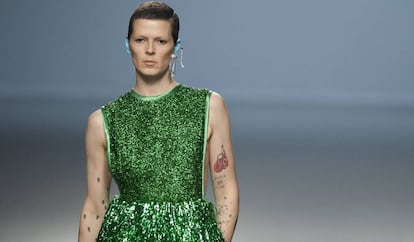Prosecutors investigate hate tweets after Spanish model’s death
Experts say it will be difficult to bring charges against trolls who mocked Bimba Bosé
Spain’s social networks overflowed with messages of condolence following the death of the multi-faceted Bimba Bosé on Monday at the age of 41 after a two-year battle with cancer. One of Spain’s best-known models, famous for her androgynous look, Bimba Bosé was also an actor and singer, and had important family connections: her uncle, Miguel Bosé, is a famous singer, and her grandfather, Luis Miguel González Lucas, was a bullfighter, chronicled by Ernest Hemingway in his posthumous novel The Dangerous Summer.

But as well as tributes, there were also plenty of hostile comments in the Twittersphere. Some were so offensive that on Wednesday, Elvira Tejada, a public prosecutor specializing in cybercrime, announced she would be looking into whether any of them could be considered hate crimes because of their homophobic content.
On Tuesday, the hashtag #ataquesBimbaM4 became a trending topic on Spanish Twitter and a battleground between far-right trolls and Bosé supporters. The attacks centered on the sexual orientation of both Bosé and her uncle Miguel. Many were made by people who identified themselves as right-wing and Catholic, with some celebrating her death.
No one can think that they are above the law just because they are on social media Rafael Catalá, Spain’s Justice Minister
There have been a number of high-profile cases in Spain over recent years that have seen the courts hand down jail sentences for offensive tweets, mostly related to alleged insults toward victims of terrorism or promoting terrorism.
At the same time, there has been mounting criticism that the courts are threatening freedom of speech. In January, the grand-daughter of a Franco-era minister who was assassinated by ETA condemned public prosecutors who called for a 30-month prison term and three-years probation for a student who tweeted jokes about the 1973 terrorist attack.
Sources told Spanish news agency EFE that the case of the Bosé tweets will be “very difficult” because criminal action against hate speech can only be brought forward by the victim.
The prosecutor’s announcement came shortly after Spanish Minister of Justice Rafael Catalá said the messages should be investigated. He also highlighted the Popular Party government's stance on toughening the penalties for online hate crimes and discrimination.
“No one can think that they are above the law just because they are on social media," said Catalá.
Juan Pedro Yllanes, a deputy with the anti-austerity Podemos party and former judge, backed the government. In an interview on Tuesday, he said he was “absolutely convinced” that public prosecutors would act against the insults on Twitter.
The attacks centered on the sexual orientation of Bimba Bosé
“It is part of their obligation to do something,” he said, adding that freedom of expression “has to contain the same substance for all citizens, regardless of who comes off badly.”
Last October, Spanish prosecutors investigated another online hate case that centered on a bullfighting event to raise money for an eight-year-old boy with cancer. The case was brought forward by the Síndic de Greuges union in Spain's Valencia region because they found the flurry of tweets by opponents of bullfighting to be “immoral and regrettable” attacks on the boy.
Investigators also opened a case following a stream of offensive tweets after bullfighter Victor Barrio died last July, but eventually ruled that the messages did not constitute an incitement to hate.
English version by Alyssa McMurtry.
Tu suscripción se está usando en otro dispositivo
¿Quieres añadir otro usuario a tu suscripción?
Si continúas leyendo en este dispositivo, no se podrá leer en el otro.
FlechaTu suscripción se está usando en otro dispositivo y solo puedes acceder a EL PAÍS desde un dispositivo a la vez.
Si quieres compartir tu cuenta, cambia tu suscripción a la modalidad Premium, así podrás añadir otro usuario. Cada uno accederá con su propia cuenta de email, lo que os permitirá personalizar vuestra experiencia en EL PAÍS.
¿Tienes una suscripción de empresa? Accede aquí para contratar más cuentas.
En el caso de no saber quién está usando tu cuenta, te recomendamos cambiar tu contraseña aquí.
Si decides continuar compartiendo tu cuenta, este mensaje se mostrará en tu dispositivo y en el de la otra persona que está usando tu cuenta de forma indefinida, afectando a tu experiencia de lectura. Puedes consultar aquí los términos y condiciones de la suscripción digital.








































